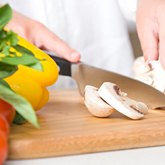 Choose from hundreds of foods, from almonds to zucchini, and find out their effects on your health.
Choose from hundreds of foods, from almonds to zucchini, and find out their effects on your health.
Find out the hidden health benefits in your favorite foods. Browse the index from A to Z and discover the powerful nutrients, vitamins, and minerals each food contains — plus the medical conditions and concerns these foods can help treat.

